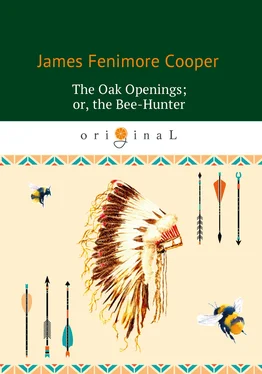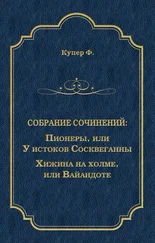“What you say may be true enough. We are not to suppose that the canoes you saw pass are all that are on the lake. But let the savages be whom they may, prudence tells us to keep clear of them if we can; and this more so than ever, now I can see that Pigeonswing, who I know to be an American Injin, is treated by them as an enemy.”
“How are the savages employed now, Bourdon? Do they prepare to eat, or do they torture their prisoner?”
“No fear of their attempting the last to-night. There is an uneasiness about them, as if they still smelt the liquor; but some are busy cooking at the fire. I would give all my honey, pretty Margery, to be able to save Pigeonswing! He is a good fellow for a savage, and is heart and hand with us in this new war, that he tells me has begun between us and the English!”
“You surely would not risk your own life to save a savage, who kills and scalps at random, as this man has done!”
“In that he has but followed the habits of his color and race. I dare say WE do things that are quite as bad, according to Injin ways of thinking. I DO believe, Margery, was that man to see ME in the hands of the Pottawattamies, as I now see HIM, he would undertake something for my relief.”
“But what can you, a single man, do when there are twenty against you?” asked Margery, a little reproachfully as to manner, speaking like one who had more interest in the safety of the young bee-hunter than she chose very openly to express.
“No one can say what he can do till he tries. I do not like the way they are treating that Chippewa, for it looks as if they meant to do him harm. He is neither fed, nor suffered to be with his masters; but there the poor fellow is, bound hand and foot near the cabin door, and lashed to a tree. They do not even give him the relief of suffering him to sit down.”
The gentle heart of Margery was touched by this account of the manner in which the captive was treated, and she inquired into other particulars concerning his situation, with a more marked interest than she had previously manifested in his state. The bee-hunter answered her questions as they were put; and the result was to place the girl in possession of a minute detail of the true manner in which Pigeonswing was treated.
Although there was probably no intention on the part of the captors of the Chippewa to torture him before his time, tortured he must have been by the manner in which his limbs and body were confined. Not only were his arms fastened behind his back at the elbows, but the hands were also tightly bound together in front. The legs had ligatures in two places, just above the knees and just below the ankles. Around the body was another fastening; which secured the captive to a beech that stood about thirty feet from the door of the cabin, and so nearly in a line with the fire within and the lookout of le Bourdon, as to enable the last distinctly to note these particulars, aided as he was by his glass. Relying on the manner in which they secured their prisoner, the savages took little heed of him; but each appeared bent on attending to his own comfort, by means of a good supper, and by securing a dry lair in which to pass the night. All this le Bourdon saw and noted too, ere he dropped lightly on his feet by the side of Margery, at the root of the tree.
Without losing time that was precious, the bee-hunter went at once to the canoes and communicated his intention to Waring. The moon had now set, and the night was favorable to the purpose of le Bourdon. At the first glance it might seem wisest to wait until sleep had fallen upon the savages, ere any attempt were made to approach the hut; but Boden reasoned differently. A general silence would succeed as soon as the savages disposed of themselves to sleep, which would be much more likely to allow his footsteps to be overheard, than when tongues and bodies and teeth were all in active movement. A man who eats after a long march, or a severe paddling, usually concentrates his attention on his food, as le Bourdon knew by long experience; and it is a much better moment to steal upon the hungry and weary, to do so when they feed, than to do so when they sleep, provided anything like a watch be kept. That the Pottawattamie would neglect this latter caution le Bourdon did not believe; and his mind was made up, not only to attempt the rescue of his Chippewa friend, but to attempt it at once.
After explaining his plan in a few words, and requesting Waring’s assistance, le Bourdon took a solemn leave of the party, and proceeded at once toward the hut. In order to understand the movements of the bee-hunter, it may be well now briefly to explain the position of the chiente, and the nature of the ground on which the adventurer was required to act. The hut stood on a low and somewhat abrupt swell, being surrounded on all sides by land so low as to be in many places wet and swampy. There were a good many trees on the knoll, and several thickets of alders and other bushes on the lower ground; but on the whole, the swamps were nearly devoid of what is termed “timber.” Two sides of the knoll were abrupt; that on which the casks had been rolled into the lake, and that opposite, which was next to the tree where Boden had so long been watching the proceedings of the savages. The distance between the hut and this tree was somewhat less than a mile. The intervening ground was low, and most of it was marshy; though it was possible to cross the marsh by following a particular course. Fortunately this course, which was visible to the eye by daylight, and had been taken by the fugitives on quitting the hut, might be dimly traced at night, by one who understood the ground, by means of certain trees and bushes, that formed so many finger-posts for the traveller. Unless this particular route were taken, however, a circuit of three or four miles must be made, in order to pass from the chiente to the spot where the family had taken refuge. As le Bourdon had crossed this firm ground by daylight and had observed it well from his tree, he thought himself enough of a guide to find his way through it in the dark, aided by the marks just mentioned.
The bee-hunter had got as far as the edge of the marsh on his way toward the hut, when, pausing an instant to examine the priming of his rifle, he fancied that he heard a light footstep behind him. Turning, quick as thought, he perceived that pretty Margery had followed him thus far. Although time pressed, he could not part from the girl without showing that he appreciated the interest she manifested in his behalf. Taking her hand, therefore, he spoke with a simplicity and truth, that imparted to his manner a natural grace that one bred in courts might have envied. What was more, with a delicacy that few in course would deem necessary under the circumstances, he did not in his language so much impute to concern on his own account this movement of Margery’s, as to that she felt for her brother and sister; though in his inmost heart a throbbing hope prevailed that he had his share in it.
“Do not be troubled on account of Gershom and his wife, pretty Margery,” said the bee-hunter, “which, as I perceive, is the main reason why you have come here; and as for myself, be certain that I shall not forget who I have left behind, and how much her safety depends on my prudence.”
Margery was pleased, though a good deal confused. It was new to her to hear allusions of this sort, but nature supplied the feeling to appreciate them.
“Is it not risking too much, Bourdon?” she said. “Are you sure of being able to find the crossing in the marsh, in a night so very dark? I do not know but looking so long at the bright light in the cabin may blind me, but it DOES seem as if I never saw a darker night!”
“The darkness increases, for the star-light is gone; but I can see where I go, and so long as I can do that there is not much fear of losing my way. I do not like to expose you to danger, but – ”
Читать дальше












